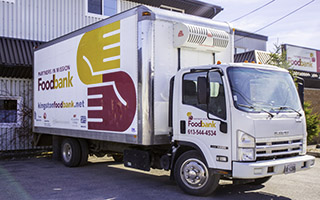 As I plan for my retirement next year, this as it turns out, will be my last Christmas letter. I have been writing these letters for about 20 of my 25 years with the food bank in the hope that by letting the community know what we are doing and how great the need is for emergency food relief, it will remind our donors that we need their support.
As I plan for my retirement next year, this as it turns out, will be my last Christmas letter. I have been writing these letters for about 20 of my 25 years with the food bank in the hope that by letting the community know what we are doing and how great the need is for emergency food relief, it will remind our donors that we need their support.
For 34 years, Partners in Mission Food Bank has been helping low-income families and individuals with emergency food relief. That means there are now 34-year-olds who have never known a world without food banks and might have the perception that this is the best we can do. Some might think that poverty has been looked after, “sure there are poor people but they can always go to a food bank, shelter or a hot meal program and get fixed up.” All those essential services are doing their best to mitigate one symptom of poverty and a pretty important one at that, but we are only scratching the surface of a much broader and more complex issue.
The complexity of poverty is driven home to us every year when we review how many hampers we gave out in the year (13,000 in 2018), how many more that is since last year (a five per cent increase), and how many clients are working (14 per cent). The picture this paints is very disturbing when we consider how our current provincial government is attempting to change the narrative of what causes poverty in the first place. Get a job, any job, and you will rise out of poverty. This begs the question: What kind of jobs? And where are they?
The top five job titles listed online in Ontario are for jobs in retail, hospitality, delivery, as caregivers and as sales representative. The retail sector is the second largest employer (to health care) in Ontario at 11 per cent of the workforce. It is well documented that many in this sector earn minimum wage and may be without benefits. So how are these kinds of jobs going to provide workers with enough money to secure affordable housing and maintain a stable home for a family? They don’t.
What we heard from Queen’s Park is a punitive approach to getting folks off the Ontario Works rolls by forcing them into very unstable work environments. Sure this will save taxpayers money in the short term, but what happens long-term we have seen before. When a large segment of the population is forced into poverty, health-care costs increase, families are stressed and fall apart, more children are displaced and there is ultimately more criminal activity. Even people receiving ODSP will be facing more scrutiny, and as hard as it has been to secure this support in the past, it will become more challenging moving forward. Work will not help these folks.
This is a global problem described as “the new economy” that is essentially big business doing all it can to eliminate the need to employ people or worse, to do business in countries where no employment standards exist and wages are unlivable. We can continue to rearrange deck chairs on the Titanic and watch poverty increase around the world or take steps now to protect livable wages and job security that rebuild a stable economy for all of us. It may be a dream to turn the tide, but if nothing is done to offer people adequate supports until better opportunities return, food banks will continue to be essential to a growing number. What has always amazed me over these many years is the level of support Kingston has given to our service and ultimately helping our low-income neighbours. I would like to thank you all for the funding and food donations and I hope that this will continue, as it is needed now as it was in 1984. It has been a great honour to be a part of this ongoing effort. From all of us here at Partners in Mission Food Bank, have a Merry Christmas and a safe and healthy new year.
Sandy Singers
Executive Director - Partners in Mission Food Bank


